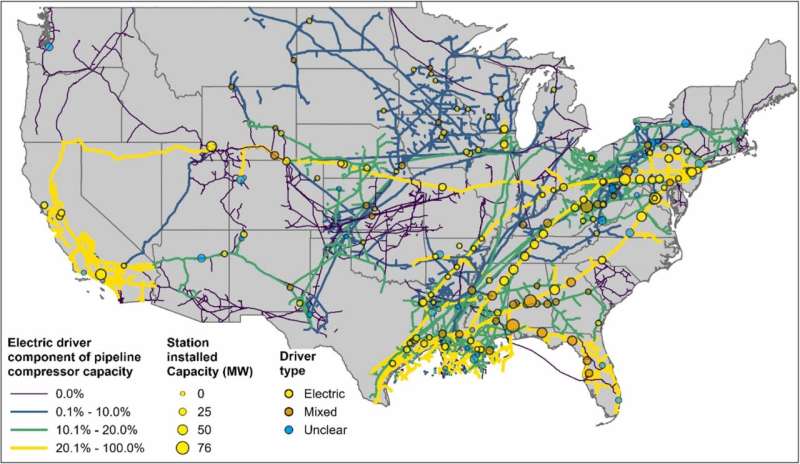US natural gas pipelines vulnerable to electric outages

Natural gas supplies 32% of all primary energy in the United States, its share of electricity generation having nearly doubled from 2008 to 2021. The cross-country natural gas pipeline system used to be powered mainly by natural gas, but recently has switched in places to electric power. The natural gas pipeline system has generally been much more reliable than the electric power system.
The new dependence on electricity has created a vulnerability during hurricanes and other events that can take out electric power, since lack of natural gas may in turn cause gas-powered electric generators to fail. Gas-electric interdependencies have contributed to several major electric system emergencies due to gas shortages at times of high electric load, including a Texas 2021 event that led to more than 200 deaths.
In new research, Carnegie Mellon investigators have investigated the vulnerability of electric power generation to electric outages at U.S. pipeline compressor stations. They found that about 10% of such stations are electric, and thus vulnerable to electric power outages, and they suggest steps to address the potential for hazards.
The study is published in Electricity Journal. The team included Sean Smillie, a doctoral candidate in Engineering and Public Policy (EPP), Professor M. Granger Morgan of EPP and Electrical and Computer Engineering, and Professor Emeritus Jay Apt of EPP and in CMU’s Tepper School of Business.
“The North American Electric Reliability Corporation has stated that addressing gas-electric interdependency risks is a top priority that requires immediate attention,” notes Smillie, who led the study. “But due in part to the lack of regulatory oversight of the gas transmission system and the extent of reliance on electric compressors, the potential consequences of failure are not well understood.”
Natural gas pipelines use both gas- and electric-powered compressor units. Electrically powered compressor stations on natural gas transmission pipelines have been identified as a possible contributor to gas shortages. Electrically-dependent stations are vulnerable to electric outages during these events, and loss of these stations could cause downstream losses of gas-fired electric generators.
Compressor stations typically have enough backup power on site for auxiliary demands (e.g., control systems, lighting, cooling fans), but electrically driven compressors are usually too large for practical on-site backup. Therefore, an electric outage to a compressor station—an event that is quite possible during hurricanes or other similar events—could take all on-site electric compressor units out of service.
In what the authors say is the first rigorous effort to identify the number of U.S. electric compressor stations, they examined data from 2008 to 2020, finding nearly 1,500 stations or substations. Of these, they determined that approximately 10% are electric, with several large pipelines vulnerable to electric outages. California, the Midwest, the Gulf Coast, and the East have high levels of installed electric compressor capacity. New hydraulic models, verified by past events, show that disrupting power to a single pipeline compressor station can force a loss greater than 2 gigawatts of downstream gas generators.
“During times of high gas demand, electric outages that disable compressors at these stations can significantly reduce gas available to downstream generating stations,” explains Morgan, who co-authored the study. “In some cases, the resulting outages could be as large as or larger than the most severe single-cause failure currently considered in electric reliability planning.”
Morgan has chaired three committees of the National Academies of Sciences, Engineering, and Medicine (NASEM) on the electrical grid.
Based on their findings, the authors suggest that electric utilities should immediately incorporate the identified facilities into critical facility lists. The authors’ findings support the recommendations of a recent study by the National Academies of Sciences, Engineering, and Medicine.
“In contrast to well-established reliability reporting and standards for the electrical system, the gas system has almost no reliability transparency or oversight,” says Apt, who co-authored the study. “Establishing a federal gas reliability organization, comparable to what is now done for electric power, could improve gas reliability by establishing appropriate reliability reporting, incident investigation, and minimum industry standards.”
More information:
Sean Smillie et al, How vulnerable are US natural gas pipelines to electric outages?, The Electricity Journal (2023). DOI: 10.1016/j.tej.2023.107251
Citation:
US natural gas pipelines vulnerable to electric outages (2023, April 11)
retrieved 11 April 2023
from https://techxplore.com/news/2023-04-natural-gas-pipelines-vulnerable-electric.html
This document is subject to copyright. Apart from any fair dealing for the purpose of private study or research, no
part may be reproduced without the written permission. The content is provided for information purposes only.
For all the latest Technology News Click Here
For the latest news and updates, follow us on Google News.
